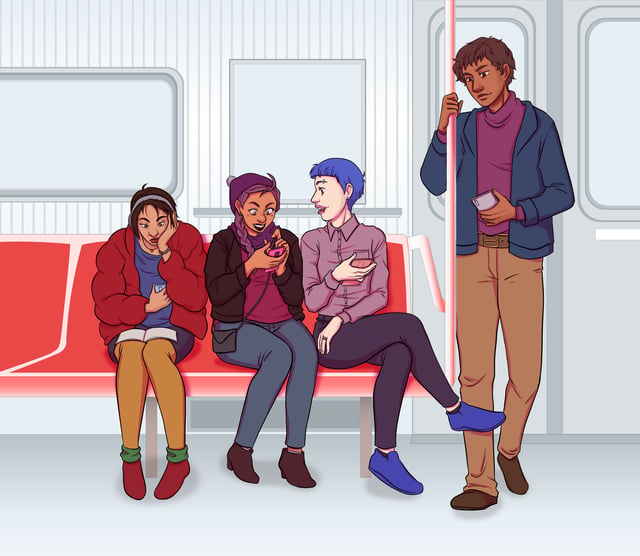In order to understand exactly how racism is executed in Romancelandia, you first have to understand what you won’t see. There won’t be proudly displayed Klan robes on an author’s Facebook page or a “White Romances Only” policy posted on a review blog. You won’t find contests that expressly forbid authors of color from entering their work or publishers that plainly state they have no intention of acquiring or publishing any stories by authors of color, especially if they feature characters of color. If you’re looking for burning crosses or tiki torch parades, you won’t find very many. Because racism in Romancelandia, generally, is far more subtle.
Racism in Romancelandia is telling an author of color their Black female lead is “unrealistic” because she’s a doctor.
Racism in Romancelandia is telling an author of color it would be “easier” if their Black MC was rewritten as a white man.
Racism in Romancelandia is publishing a “good slave master” novel and then labeling the poc who speak out about it a “lynch mob.”
Racism in Romancelandia is questioning the very existence of Black authors and Black romance readers.
Racism in Romancelandia is committing racist microaggressions and when confronted only apologizing to your white peers.
Racism in Romancelandia is prioritizing the hurt feelings of Nice White Women™ who get called out for harmful representation over the actual harm to the marginalized communities they, intentionally or not, maligned with their work.
Racism in Romancelandia is insisting you can’t relate to a character of color...but somehow having no problem relating to vampires, werewolves, and rat shifters.
Racism in Romancelandia is giving 4 and 5 star reviews to novel after novel after novel where queer poc only exist to suffer endlessly and brutally until they are saved by their white love interest.
Racism in Romancelandia is telling authors and readers of color if they were nicer and gentler and kinder when calling a racist thing a racist thing then the racists would surely listen.
Racism in Romancelandia is being terribly concerned about the mental health of the Nice White Woman™ who is being held accountable for her micro and macro aggressions, but not even giving a thought to the mental health of the woc who was on the receiving end of her micro and macro aggressions. After all...they’re just a bunch of mean girls anyway, right?
Racism in Romancelandia is not a fast and furious flash flood that leaves undeniable and immediate visual proof of its destruction, but instead is the stealthy and steady drip drip drip of a single drop of water from a never ending supply that slowly but surely seeks to obliterate the surface it lands on.
But here’s the thing: Wherever there is racism, there is resistance. And the resistance in Romancelandia is led by authors and readers of color who are unbroken and unyielding and unwilling to bend the knee to those who insist our stories and our communities and our HEA’s are worthless and worth less. Yes, there are absolutely white readers and authors who are allies and they are valued and needed and appreciated but make no mistake: When it comes to the fight against racism in Romancelandia, the people most likely to be targeted are also the people most likely to be taking the risks, enduring the abuse, and doing the work to address the issue.
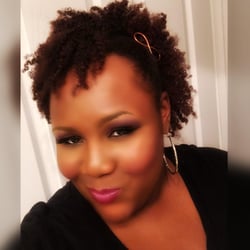 LaQuette is one of those people. She’s won multiple prestigious awards, including the 2016 Author of the Year Golden Apple Award and is currently serving as President of the RWA/NYC. A woman whose presence is as undeniable as her talent, LaQuette is as committed to helping create a more inclusive and anti-racist Romancelandia as she is to penning passionate stories of love, hope, and happily ever after for characters of color.
LaQuette is one of those people. She’s won multiple prestigious awards, including the 2016 Author of the Year Golden Apple Award and is currently serving as President of the RWA/NYC. A woman whose presence is as undeniable as her talent, LaQuette is as committed to helping create a more inclusive and anti-racist Romancelandia as she is to penning passionate stories of love, hope, and happily ever after for characters of color.
Her latest novel, Under His Protection, will be available on April 16 from Dreamspinner Press and it’s a contemporary gem that’s part second chance romance, part romantic suspense, and completely amazing.
[Dylan's review will go up next week, and we're giving away a copy at the bottom of this interview.]
Read on for our interview with LaQuette!
******************************
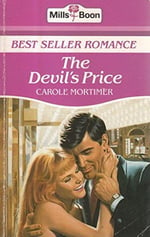 When did your love affair with romance novels begin?
When did your love affair with romance novels begin?
When I was sixteen. I was in an Earth Science class my junior year at Erasmus Hall HS in Brooklyn, when I spotted my friend reading a Harlequin Presents. I was making fun of her for reading one of those “cheesy” books. She shut me down with five words: “Have you ever read one?” When I answered no, she told me I should probably read one before I disparaged an entire genre. I figured she was right. She lent me her book, “Devil’s Price” by Carole Mortimer, and I was hooked.
What sparked your transition from romance reader to romance writer?
Writing has always been my preferred method of expression. But what prompted me to create my own stories was a need to see characters that looked, lived, and loved like me on the page. I loved Harlequin Presents. But since there were no curvy black chicks from Brooklyn on their covers, I needed to create those stories for myself.
If you had to pick a favorite romance novel trope, what would it be and why?
Again, there are so many. I am a tropey kind of reader and writer. I love it when I can easily frame a story through its tropes. But I also like to twist and subvert those tropes just to mess with my readers’ heads a bit too. If I had to pick a favorite, it would be enemies to lovers. Nothing makes me smile more when two people who can’t stand each other finding passion and love underneath all that hatred.
If you could co-write or collaborate with any other romance writer, who would it be and why?
There are just so many to choose from! If I had to pick I’d say Amy Lane and Tere Michaels for their ability to write gut-punching emotion, Avril Ashton for her ability to write sex scenes that are so beautiful and yet edgy you can’t figure out where to breathe, and Adriana Herrera for her ability capture social consciousness with such zeal and clarity.
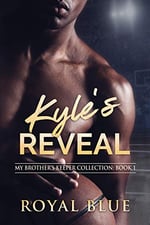 What’s on your Kindle or bedside table right now? What have you read recently that cleared your skin, watered your crops, and blessed you with eternal life?
What’s on your Kindle or bedside table right now? What have you read recently that cleared your skin, watered your crops, and blessed you with eternal life?
Woman!! I had the opportunity to read book three in Adriana Herrera’s Dreamers series. It will touch your soul as if Jesus stepped down off the throne just to bless you with that gift. You cannot read that book and not want to be an activist for social change. The next thing in queue is Royal Blue’s Kyle’s Reveal. I cannot wait to tear into it!!! Since the days of the late, great E. Lynn Harris, this is the first time in a long time I have my pick of gay romances featuring black and Afro-Latinx characters written by black authors. Honey, I am here for it!
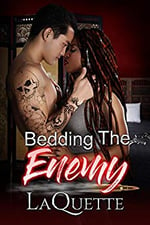 For readers who may be unfamiliar with your work, what should they know about the type of romances you write and where would you advise them to start if they wanted to dig into your backlist?
For readers who may be unfamiliar with your work, what should they know about the type of romances you write and where would you advise them to start if they wanted to dig into your backlist?
I write both het and gay romances. When you pick up a LaQuette book, you’re gonna get a lot of snark, because sarcasm and smart-mouthed characters are my jam. But mostly, you will find a celebration of my blackness in my books. There is this flawed logic that the only way marginalized characters can find their HEA is if they earn it by going through some unimaginable struggle. I don’t write struggle stories. My people may be down at certain points of their lives, but they’re never broken. I essentially write whole human beings who have real depth to them.
If they want to find my backlist, they can check out my website, or Amazon. If there's one of my books that defines my writing style I'd say it was Bedding The Enemy. It's a quick and dirty (I'm not kidding. That is a hot, filthy book) novella that shows you the rougher side of my work.
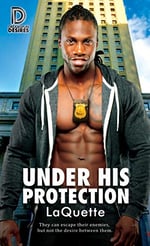 Your latest release, Under His Protection, is a scorching hot second chance romance between NYPD Lieutenant Elijah Stephenson and Prosecutor Camden Warren.
Your latest release, Under His Protection, is a scorching hot second chance romance between NYPD Lieutenant Elijah Stephenson and Prosecutor Camden Warren.
Cam and Elijah had an unforgettable night of passion five years prior that left Elijah’s body weak and his ego bruised when Cam inexplicably ghosted on him. Elijah’s never quite managed to forget the man who so thoroughly rocked his world but an on the job attack that left him near dead and questioning his confidence has taken precedence over the pretty prosecutor...until the day Elijah walks into his precinct expecting a cushy desk job in Cyber Crimes and ends up being assigned to protect Elijah from a dangerous cult hellbent on making sure he dies before he can put their leader behind bars. When Elijah decides the safest place Cam can be is in his home—and his bed—and Elijah’s family pops up for a surprise visit, crossing the thin line between duty and desire leaves both men fighting for their lives, their love, and their professional futures.
What was your inspiration for Cam and Elijah’s story?
I wanted to write my version of a prince and a pauper type of story. I wanted to bring someone who was used to living uptown into a downtown sort of reality, to strip that character down to his basics to express the idea that our humanity is what connects us.
On the surface, it would seem like Camden and Elijah are a tale of opposites attracting: They are different races, come from different economic backgrounds, have vastly different relationships with their fathers and families, and seem to come from two completely different worlds. But when you read their story, you discover they’re actually cut from largely the same cloth. How did you approach finding and cultivating the common ground between the confident but down to earth and family-oriented Elijah and the cocky but secretly sweet and smothered by familial expectations Camden?
For me it’s a matter of finding what links them on a human level. They both believe in serving the community at large. They both believe in being dutiful sons. They both love passionately. The trick is to express those shared characteristics through the unique lenses of each character. So, although Camden loves his father and had been an obedient son, we get cool reservation when it comes to his father and family. However, when we see those same characteristics through Elijah’s eyes we get warmth and nurturing instead. It’s all psychology.
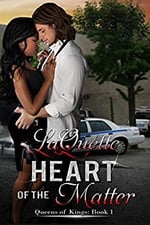 Capt. Heart Searlington, from your acclaimed Queens of Kings series, is a secondary character in this book. I love how you gave us just enough of Heart to make us curious about her and her story without overshadowing the main pairing or going full info dump.
Capt. Heart Searlington, from your acclaimed Queens of Kings series, is a secondary character in this book. I love how you gave us just enough of Heart to make us curious about her and her story without overshadowing the main pairing or going full info dump.
How did you go about tying in such a richly developed series while at the same time making sure that Under His Protection could be read as a standalone?
The Queens of Kings series is a very different world. There are some similarities, but it is very heroine centered. This book was always going to be about the two heroes and their individual and collective journeys to happiness. My readers adore Heart, so whenever I get an opportunity to let her show up, I do. Placing Elijah in her precinct was a calculated move that paid off. The trick is to make her show up at some of the big external plot moments in the story but have all of the emotional stuff center on Camden and Elijah.
For your cover you chose to highlight Elijah’s character, rather than Camden’s. One of the ongoing discussions in M/M romance is the lack of support from some bloggers, reviewers, readers, and fellow authors when AOC write about characters of color. Your choice of a cover model makes both a super-hot visual and a powerful statement. Was there any hesitation on your part to feature your Black male lead as opposed to your white male lead?
NEVER! My stance has always been to celebrate my blackness and that of my characters. Black is nothing to be ashamed of, and if I don't appreciate how beautiful my blackness is, no one else ever will either.
When Dreamspinner optioned this story, I was very clear I wanted a black man on the cover. One thing I treasure about this company is that they never shied away from the hard work. So, we definitely talked about bias and how it could impact this release negatively. But all parties involved were insistent that Elijah was the right character to place on the cover.
Dreamspinner has been an incredible partner in my quest to bring the stories of black people in the LGBT+ community to light. They have been so supportive and understanding, and they are working overtime to make certain this book is a success.
You’re a Black woman writing romances that prominently feature Black characters and you’re President of the RWA/NYC, so I can imagine you have some pretty strong feelings and deep thoughts about the ongoing situation with RWA’s RITA Awards and the issues surrounding judging practices that routinely shut out authors of color writing about characters of color and are particularly biased against Black authors writing about Black characters.
What concrete steps do you feel need to be taken in order to level the playing field?
Well, as President of my local chapter, there’s not a great deal I can say officially about what the organization will or won’t do to address these issues of bias and racism against black authors and characters with respect to the RITAs and the organization as a whole. It’s above my pay-grade. I don’t sit on the board of directors and that is certainly a task they have to handle.
This is strictly my opinion. I am not making a statement for RWA, nor RWANYC when I say, it has become overwhelmingly obvious that there is bias against black authors and black characters regarding judging in the RITAs. The judging is performed by a select group in membership. Well, as far as I'm concerned, if membership cannot be trusted to judge those books fairly, then judging should be removed from the membership. I believe an outside body should be trained and cultivated to judge the first round of the RITAs.
I do not know if the board of directors will implement that change, or any number of suggestions that are being thrown their way at this time. But I can say they are taking this issue seriously and are taking steps to hopefully bring about the kind of change black authors need to see. The kind of lasting change that will be beneficial to the entire organization.
The RWA board has expressed a sincere desire to move towards a more inclusive organization and awards process that honors the stories and HEA’s of all the residents of Romancelandia. While they’ve had a lot of support, their efforts have also exposed the deeply entrenched racism and homophobia of some of the organization's members. At this point there’s a clear division between romance readers and writers who want to move the organization forward and those who are determined to uphold the status quo.
With more and more AOC and queer romance writers claiming their seats at the table, have we reached the point of “Move, or you shall be moved” in terms of dealing with those who are actively seeking to block change?
That's a twofold answer. First, I have always believed in standing up to be counted. Wherever I am, I make my presence known. That ideology has served me well over the years. We have to be steadfast. It can be uncomfortable. Hell, it can be downright scary. But the truth is, if we stay out of these spaces, we are robbing ourselves of access to knowledge, business tools, and networking connections that can be vital for professional success. It's nice to be invited, but sometimes you have to kick the door in and sit down like you're supposed to be there. Because the truth is, you have every right to sit there too.
Second, there is the service aspect to consider. You can’t be angry about the current state of affairs if you aren’t taking part and actively working to bring about change. I wanted to see more diversity across romance publishing. I knew the first step was to join the organization for romance writers. I also knew I had to do more than attend a meeting here or there. I had to actively work within my local chapter to make sure people understood: 1) I was here, and I wasn’t going anywhere. 2) To normalize those that may not have been accustomed to someone like me, or someone like my characters to my presence and the presence of my work in professional spaces.
I am fortunate. New York is a melting pot, diversity is embedded in the concrete. But even though the city is diverse, there were a few people who saw me as an oddity at first. That quickly changed, shortly after I arrived for two reasons. 1) Again, I wasn’t going anywhere. 2) The board of directors of RWANYC let me know that I was welcome and engaged me to take part in not just the meetings, but in how things were run behind the scenes.
I have no problems voicing my anger and displeasure at issues like bias and racism in romance publishing. However, after I’m done hollering on social media, I have to get back to the work of making the change happen from within the machine. We have every right to walk away and disengage. But if we don't stay and fight (and Lord knows that fight seems harder with each passing year), we will never see the change we deserve.
This is normally where I ask what you’re working on for the future, but you’ve recently announced you have another project with Dreamspinner Press coming at us that’s set during the Harlem Renaissance. Please, tell us a little bit more about it. How did it come about and what we can expect out of the Harlem Heat Series?
Well, if you want to know the truth, I was pissed off. I was angered because many black authors who were writing historical romances were getting slammed with the, “not historically accurate,” criticism when it came to their work. The truth is, these books weren’t historically inaccurate, it’s just that the mainstream population isn't often aware of black history beyond what’s spoon-fed to them in elementary school for black history month.
So, I decided I would write about a time in history where blackness and queerness (not to use the term as my own word, but as an academic term) were interlinked and celebrated. Stone Washington, Tennyson Westly, and Blue Bellamy are all based on actual men who lived during and contributed to the Harlem Renaissance.
Whatever I do, I do it for the culture, and this series will be black and hot AF. I just hope the M/M romance world is ready.
If you could give one piece of writing advice to aspiring romance writers, what would it be?
Take your craft seriously. I spent more than a decade educating myself about the craft of writing before I published a book. I still seek to learn new techniques, things that will strengthen my voice, my world-building, and my prose. Writing is hard. Treat it with the respect it deserves by edifying yourself first.
******************************
 We were so honored to have LaQuette come by and bless us with her wisdom, grace, and honesty. If you’re curious about what I thought of Under His Protection, my review goes up on April 15 (the day before release) and if you want to grab a copy of the book for yourself (and trust me, you do) you can do so here:
We were so honored to have LaQuette come by and bless us with her wisdom, grace, and honesty. If you’re curious about what I thought of Under His Protection, my review goes up on April 15 (the day before release) and if you want to grab a copy of the book for yourself (and trust me, you do) you can do so here:
Barnes & Noble
LaQuette is the 2016 Golden Apple Award Author of the year winner. She writes bold & sexy tales for diverse characters who are confident in their right to appear on the page. Represented by Latoya C. Smith of LCS Literary Agency, you can visit her at her website at LaQuette.com , email her at LaQuette@LaQuette.com, or connect with her on social media on her Twitter, Facebook, or Instagram pages.
One last thing! We're giving away a digital copy of Under His Protection!
This giveaway will run from April 8, 2019 - April 14, 2019 (at 11:59 pm) EST. Void where prohibited, sponsored by Love in Panels. Open wherever the book is sold, which means you'll need to check if you can buy it in your country if you're not in the US (we're trying, but this stuff is messy!)
Ready to enter? Here's the widget. Good luck!

